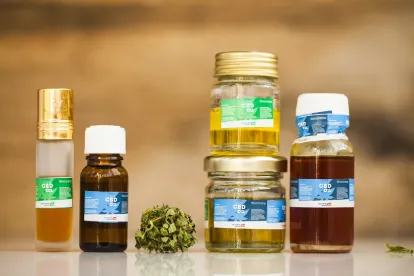The U.S. Food and Drug Administration (FDA) recently announced new steps it is taking to determine a framework for lawful marketing of appropriate cannabis and cannabis-derived products.[1] As expressed in the Agriculture Improvement Act of 2018 (the 2018 Farm Bill), the FDA has the authority to regulate products containing cannabis or cannabis-derived compounds. The 2018 Farm Bill removed hemp, defined as cannabis and cannabis derivatives with extremely low concentrations of delta-9- tetrahydrocannabinol (THC), from the Controlled Substances Act, no longer classifying it as a controlled substance under federal law.
One of the more popular and prevalent hemp products is cannabidiol, also known as CBD oil. The FDA’s recently announced framework could provide a pathway for marketing CBD oil. The FDA’s announced framework includes:
-
A public hearing on May 31, 2019, as well as a broader opportunity for written public comment for stakeholders to share their experiences and challenges with these products, including information and views related to product safety.
-
The formation of a high-level internal agency working group to explore potential pathways for dietary supplements and/or conventional foods containing CBD to be lawfully marketed, including a consideration of what statutory or regulatory changes might be needed and what the impact of such marketing would be on public health.
-
Updates to the FDA webpage with answers to frequently asked questions on this topic to assist members of the public to understand how the FDA’s requirements apply to these products.
-
The issuance of multiple warning letters to companies marketing CBD products with egregious and unfounded claims aimed at vulnerable populations.
These actions items are a significant step for the future of hemp and CBD oil sales and marketing nationally. Even so, hemp is still considered a Schedule II controlled substance in Ohio.[ii] Recently, however, the Ohio Senate voted unanimously to legalize hemp and related products, including CBD oil. The bill moves on to the Ohio House of Representatives.[iii]
The pending legislation would also give authority to the Ohio Department of Agriculture to regulate hemp instead of the Ohio Department of Pharmacy as it currently stands.[iv] In Ohio, CBD oil and other hemp products can only be dispensed in a licensed Medical Marijuana Control Program dispensary at the present time. Growing, processing, or selling hemp or CBD oil in Ohio without the proper license is illegal. If the legislation passes the in the House, Ohio could be on its way to legal sales of CBD oil and hemp products. Hemp can be used in industrial applications such as paper, textiles, and biofuel. CBD oil is claimed to be a useful supplement as well.
The regulatory landscape of hemp products and CBD oil is changing, as shown by Ohio’s pending legislation and the FDA’s newly announced action items. To be compliant with the ever-changing rules and regulations surrounding marijuana, hemp, and CBD oil, please contact your Dinsmore health care attorney.
[i] The U.S. Food and Drug Administration, Statement from FDA Commissioner Scott Gottlieb, M.D., on new steps to advance agency’s continued evaluation of potential regulatory pathways for cannabis-containing and cannabis-derived products, April 2, 2019.
[ii] Ohio Revised Code § 3719.41
[iii] Karen Kasler, Senate Votes To Legalize Hemp And CBD Oil In Ohio (March 28, 2019).
[iv] Janelle Patterson, Oversight of hemp, CBD could move to Ohio agriculture department, The Marietta Times (April 3, 2019).




 />i
/>i
